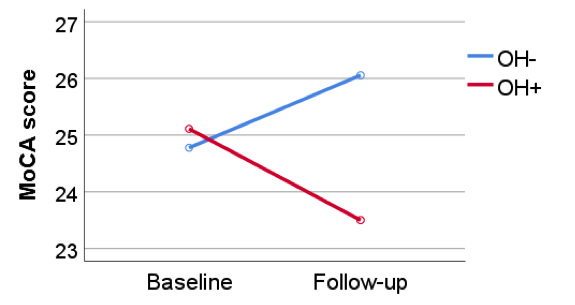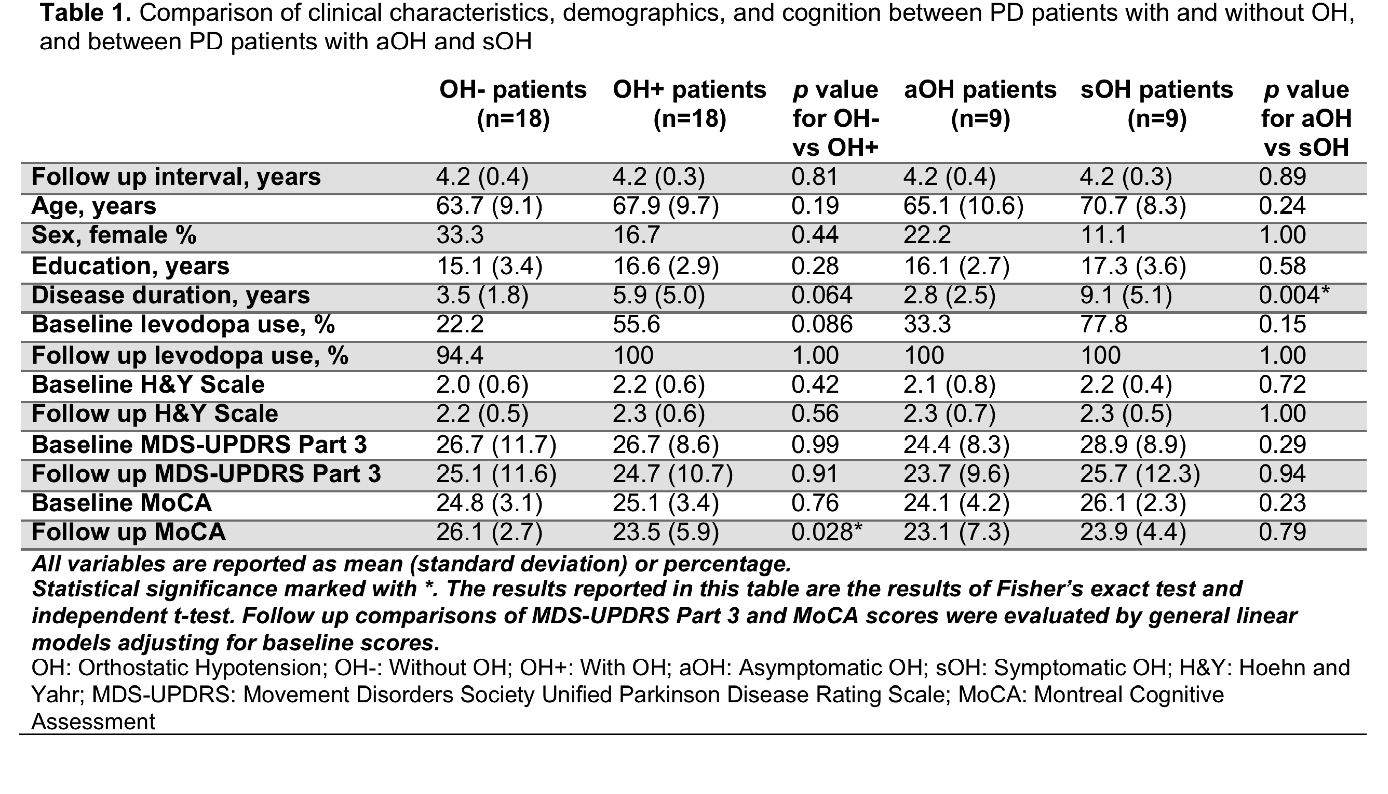Category: Parkinson's Disease: Cognitive functions
Objective: To compare cognitive changes over time between Parkinson’s disease (PD) patients with orthostatic hypotension (OH) and without OH, and between those with symptomatic OH (sOH) and asymptomatic OH (aOH).
Background: Cognitive impairment and OH are common in PD. [1, 2] OH may manifest with disabling postural symptoms including dizziness, syncope, and visual, gait, and cognitive disturbances. [3] OH can also be asymptomatic, and the relevance of symptoms is unknown. [4] Although a strong correlation exists between OH and cognitive impairment in PD, [5, 6] the underlying pathophysiology is yet to be clarified. A better understanding of the clinical significance of OH is needed for therapeutic decision-making, as allowing repeated asymptomatic cerebral hypoperfusion to go untreated might cause worsening cognition over time.
Method: Our retrospective observational study included18 PD patients with OH (9 sOH, 9 aOH), and 18 age-, sex-, education-, and disease duration-matched PD patients without OH. All patients had a minimum of 3.5 years between baseline and follow up visits (mean follow-up duration of 4.2 years). Baseline and follow-up Montreal Cognitive Assessment (MoCA) scores were compared between patients with and without OH, and between patients with aOH and sOH. Follow-up comparisons were adjusted for baseline MoCA scores.
Results: Baseline MoCA scores did not differ between the groups. [table1] Compared to PD patients without OH, PD patients with OH had significantly lower MoCA scores at follow-up. MoCA declined over time in PD patients with OH, whereas MoCA in patients without OH did not decline. [figure1] Follow-up MoCA scores did not differ between aOH and sOH patients. Motor performance remained stable over time, with no differences between groups.
Conclusion: OH may contribute to cognitive decline in PD, independent of postural symptoms. Further studies can determine whether treating OH can prevent or delay cognitive dysfunction.
References: 1. Litvan I, Aarsland D, Adler CH, et al. MDS Task Force on mild cognitive impairment in Parkinson’s disease: critical review of PD-MCI. Mov Disord 2011;26(10):1814-24. doi: 10.1002/mds.23823 [published Online First: 2011/06/09] 2. Palma JA, Kaufmann H. Epidemiology, Diagnosis, and Management of Neurogenic Orthostatic Hypotension. Mov Disord Clin Pract 2017;4(3):298-308. doi: 10.1002/mdc3.12478 [published Online First: 2017/03/16] 3. Claassen DO, Adler CH, Hewitt LA, et al. Characterization of the symptoms of neurogenic orthostatic hypotension and their impact from a survey of patients and caregivers. BMC Neurol 2018;18(1):125. doi: 10.1186/s12883-018-1129-x [published Online First: 2018/08/25] 4. Merola A, Romagnolo A, Rosso M, et al. Orthostatic hypotension in Parkinson’s disease: Does it matter if asymptomatic? Parkinsonism Relat Disord 2016;33:65-71. doi: 10.1016/j.parkreldis.2016.09.013 [published Online First: 2016/09/10] 5. Udow SJ, Robertson AD, MacIntosh BJ, et al. ‘Under pressure’: is there a link between orthostatic hypotension and cognitive impairment in α-synucleinopathies? J Neurol Neurosurg Psychiatry 2016;87(12):1311-21. doi: 10.1136/jnnp-2016-314123 [published Online First: 2016/09/09] 6. McDonald C, Newton JL, Burn DJ. Orthostatic hypotension and cognitive impairment in Parkinson’s disease: Causation or association? Mov Disord 2016;31(7):937-46. doi: 10.1002/mds.26632 [published Online First: 2016/04/19
To cite this abstract in AMA style:
K. Longardner, E. Bayram, I. Litvan. Both Symptomatic and Asymptomatic Orthostatic Hypotension is Associated with Cognitive Decline Over Time in Parkinson’s Disease [abstract]. Mov Disord. 2020; 35 (suppl 1). https://www.mdsabstracts.org/abstract/both-symptomatic-and-asymptomatic-orthostatic-hypotension-is-associated-with-cognitive-decline-over-time-in-parkinsons-disease/. Accessed October 19, 2025.« Back to MDS Virtual Congress 2020
MDS Abstracts - https://www.mdsabstracts.org/abstract/both-symptomatic-and-asymptomatic-orthostatic-hypotension-is-associated-with-cognitive-decline-over-time-in-parkinsons-disease/


